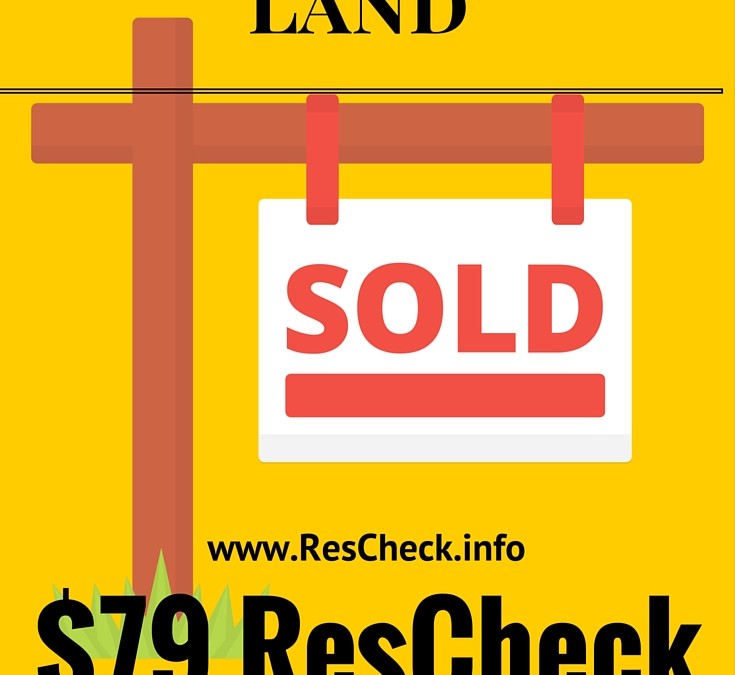Custom REScheck Report
- Any Plan
- Any Size
- Any Code
- Any State
- 24 hour turnaround or it’s free.
Land
When reviewing your project’s feasibility I made the hasty assumption that you already had that perfect piece of land to place your green home upon. This is the second most important item when constructing your green home. If you have not purchased a piece of land, moving forward with the purchase of a green home materials or installation services is like eating a box of donuts while running on the treadmill. You are wasting your time.
Any quality green home contractor will offer to walk the land with you before you buy their services. Some limitations regarding a pre-sale land inspection may involve complications caused by great distances. For example, I built a green home in San Bernardino, California and the construction company I work for is in Tennessee. In an instance like this it might be better to make a visit to your land at a later point in time. I would never recommend punishing a construction service provider for using common sense on your project.
What type of land will you build on? I am certain you already have an idea of this in your head, or maybe the land is already in your family or your possession. Maybe you just need to finalize a divorce from fighting over the finishes and budget numbers from the previous chapters of this blog. Just kidding, of course.
A real estate professional can point you in the right direction, but first you need to know what area of the country. Narrow this down with your partner. Start with which state you will build in and then progress to a smaller area like a region, county, or city. Again teamwork is key on a multi-person project. Deciding on an area that all parties can agree on will guard your project from having a key member withdrawal support during the most important phases.
Keep in mind that the previous budget we created may be met with extreme enthusiasm in some parts of the country. There are other areas where you may be laughed at. Building a green home takes tough skin. With this blog, and the resources it provides, it will ensure that you will have the last and longest laugh.
I suggest asking your real estate professional what the typical building cost are in the area and see if they mesh with what we have come up with so far. If not, there are multiple locations within a real estate agent’s territory. They might be able to point you closer to the correct piece of land and building market.
Imagine that you found your land in a bustling oil town in North Dakota. However, due to a labor shortage, even an employee at McDonald’s starts at $18.00 per hour. This drives up the cost of construction services up in the area. This is because flipping burgers is now more lucrative than hammering nails. To entice quality help you need a higher rate to attract workers. Plus the wages and opportunities for skilled construction workers are obviously very high. This is because oil companies are also competing for this type of laborer.
I am sure you can think of a town or location within 30 minutes of where you live that has a higher cost of living, real estate value, or labor rates than another location in the surrounding area.
Another instance where land is a driving force is in the instance of a planned development. There are many advantages and disadvantages of building in these properties. I like to think of it as “Brand Name Land.” Someone has given a group of properties a name, an identity, and organized a group of collective owners to manage and oversee the property after the initial inception.
The advantages of building at these properties are that they are usually filled with amenities like the following:
-Gated Entrances
-Club Houses
-Neighborhood Boat Ramps
-Community Equestrian Facilities
-Utilities like Electric, Water, Sewer
I am sure you can name a few more.
Some of the disadvantages of building in these developments would be:
-Homeowner’s fees
-Covenants
-Restrictions
-Architectural Review Committees
-Inflated Initial Land Costs
You could probably name a few more disadvantages as well.
Just be weary when building a green home. Make sure the restrictions allow the construction of a home with a smaller square footage. Even if the covenants and bylaws do not explicitly prohibit the construction there may be an architectural review committee.
These committees can be to your advantage. They maintain construction standards and keep resale values up. However, what if the people who make up the board have poor architectural taste or personal vendettas against your style of homes in general? If you purchased land in this development and just purchased your construction materials for a green home then you may be in for a major surprise. Imagine that the architectural review committee rejects your plan. You are now at the neighborhood prude club’s mercy. It happens.
When choosing your land there are many things to consider with your green home and which piece of land is right for your project. If you look hard enough you can find a reason to hate or love any piece of property. With construction costs and real estate purchases I am a supporter of the belief that you should stay within a budget. You must make sure you know what your land budget is well before shopping for real estate. Never buy a piece of land you cannot afford.
There is absolutely zero reason to buy a piece of land that pushes your project back until you are 85 years old, because you overspent on a piece of ground. By that time the odds that you will be able enjoy your new green home are very slim and the budget numbers from this blog will have probably doubled due to inflation and increasing material costs.
Also remember that it is a good idea to pay back any money that has been loaned on your land before you build. The bank may not come right out and say it, but they will penalize you if you owe too much or paid too much for the property. If you are a cash buyer, the only person you have to please is yourself.
Be reasonable when buying that magical piece of property. Do not expect it to increase in value. If it does, it is a nice bonus. I realize that everyone, since you were a kid, has told you, “Land, they are never making any more of it.” Well that is true, but when you drive through the most populated states in our country there are thousands of acres of undeveloped land.
Someone may own the property now, but they will not live forever. There will always be greedy grandchildren who care only about putting cash in their pockets. As soon as the casket is closed, they will place the family piece of land on the market. The piece of real estate that would never be “made” again is suddenly available once more. While they may not make any more land, there is always land available.
Also realize that there are hundreds of properties in every state that were purchased to be built on and never will be. I have seen this first hand. Over 80% of landowners in specific areas are from other states. Out of state speculators purchased the properties in the early 2000’s and expected to make a quick profit by flipping the property for twice what they paid. They still may, but I would advise you stay away from land for the strict purpose of turning a profit while undertaking your green home project.
Do not fall into the speculative land money trap. This wide open pit is full of others who are paying HOA fees, property taxes, lot mowing crews, and many additional everyday expenditures on land that will never be built on or enjoyed. Stay the course for the green home we are slowly creating, and you will be greatly rewarded. If you want to buy real estate and make loads of money take a break from reading and play a game of Monopoly with your construction partner. Someone always loses. Then get back to your green home project.
If you start with a feasible plan, emergency fund, and a doable budget, the project of your dreams is within your reach. If you constantly stretch and over reach you will be left with a sore pocket blog and bitter feelings. You took the correct first step of reading this guide so get out there and find your perfect lot. That is if you do not own it already.

